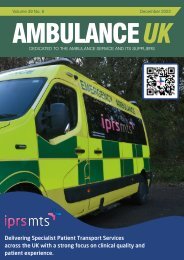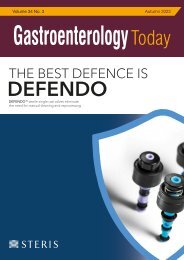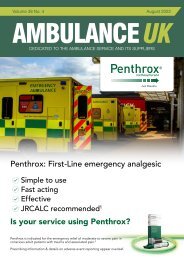Gastroenterology Today Summer 2021
Gastroenterology Today Summer 2021
Gastroenterology Today Summer 2021
Create successful ePaper yourself
Turn your PDF publications into a flip-book with our unique Google optimized e-Paper software.
Optimising<br />
maintenance therapy<br />
for ulcerative colitis:<br />
Real<br />
choices<br />
When mesalazine doesn’t seem to be working, stepping<br />
up to immunosuppressants isn’t the only option<br />
Together we know more.<br />
Together we do more.<br />
FEATURE<br />
Real<br />
solution<br />
Salofalk Granules are easy to take, they have a<br />
pleasant vanilla flavour, and they’re a proven way to<br />
help patients get the most from their mesalazine 1-3<br />
Optimising therapy with once-daily Salofalk Granules in patients<br />
who were inadequately maintained on previous mesalazine resulted in: 2<br />
69% 45% 50%<br />
fewer<br />
days<br />
off work<br />
fewer<br />
GP visits<br />
due to UC<br />
fewer<br />
steroid<br />
courses used<br />
Mesalazine, the Dr Falk way<br />
Prescribing Information (refer to full SPC before prescribing):<br />
Salofalk gastro-resistant prolonged-release granules<br />
Presentation: Stick-formed or round, greyish white gastro-resistant<br />
prolonged-release granules in sachets containing 500mg, 1000mg,<br />
1.5g or 3g mesalazine per sachet. Indications: Treatment of acute<br />
episodes and the maintenance of remission of ulcerative colitis.<br />
Dosage: Adults: Once daily 1 sachet of 3g granules, 1 or 2 sachets of<br />
1.5g granules or 3 sachets of 1000mg or 500mg granules (equivalent<br />
to 1.5 – 3.0g mesalazine daily) preferably taken in the morning,<br />
according to individual clinical requirement. May be taken in three<br />
divided doses (1 sachet of 500mg granules three times daily or 1<br />
sachet of 1000mg granules three times daily) if more convenient.<br />
Maintenance: 0.5g mesalazine three times daily (morning, midday<br />
and evening) corresponding to a total dose of 1.5g mesalazine<br />
per day. For patients known to be at increased risk for relapse<br />
for medical reasons or due to difficulties to adhere to three daily<br />
doses, give 3.0g mesalazine as a single daily dose, preferably in the<br />
morning. Children: There is only limited documentation for an effect<br />
in children (age 6-18 years). Children 6 years of age and older: Active<br />
disease: To be determined individually, starting with 30-50mg/<br />
kg/day once daily preferably in the morning or in divided doses.<br />
Maximum dose: 75mg/kg/day. The total dose should not exceed the<br />
maximum adult dose. Maintenance treatment: To be determined<br />
individually, starting with 15-30mg/kg/day in divided doses. The<br />
total dose should not exceed the recommended adult dose. It is<br />
generally recommended that half the adult dose may be given to<br />
children up to a body weight of 40kg; and the normal adult dose to<br />
those above 40kg. Method of administration: Taken on the tongue<br />
and swallowed, without chewing, with plenty of liquid. Contraindications:<br />
Hypersensitivity to salicylates or any of the excipients.<br />
Severe impairment of renal or hepatic function. Warnings/<br />
Precautions: Blood tests and urinary status (dip sticks) should be<br />
determined prior to and during treatment. Caution is recommended<br />
in patients with impaired hepatic function. Should not be used in<br />
patients with impaired renal function. Mesalazine-induced renal<br />
toxicity should be considered if renal function deteriorates during<br />
treatment. Cases of nephrolithiasis reported; ensure good hydration.<br />
Patients with pulmonary disease, in particular asthma, should be<br />
carefully monitored. Patients with a history of adverse drug reactions<br />
to preparations containing sulphasalazine should be kept under close<br />
medical surveillance. If acute intolerance reactions e.g., abdominal<br />
cramps, acute abdominal pain, fever, severe headache and rash,<br />
occur, stop treatment immediately. Severe cutaneous adverse<br />
reactions (SCARs), including Stevens-Johnson syndrome (SJS) and<br />
toxic epidermal necrolysis (TEN), have been reported. Discontinue<br />
treatment at the first appearance of signs and symptoms of severe<br />
skin reactions, such as skin rash, mucosal lesions, or any other sign<br />
of hypersensitivity. Salofalk granules contain aspartame, a source of<br />
phenylalanine that may be harmful for patients with phenylketonuria.<br />
Salofalk granules contain sucrose: 0.02mg, 0.04mg, 0.06mg and<br />
0.12mg (500mg/1g/1.5g and 3g granules respectively). Interactions:<br />
Specific interaction studies have not been performed. Lactulose<br />
or similar preparations that lower stool pH: possible reduction of<br />
mesalazine release from granules due to decreased pH caused by<br />
bacterial metabolism of lactulose. With concomitant treatment with<br />
azathioprine, 6-mercaptopurine or thioguanine consider a possible<br />
increase in their myelosuppressive effects. There is weak evidence<br />
that mesalazine might decrease the anticoagulant effect of warfarin.<br />
Use in pregnancy and lactation: There are no adequate data. Do<br />
not use during pregnancy unless the potential benefit outweighs<br />
the possible risks. Limited experience in the lactation period. Use<br />
during breast-feeding only if the potential benefit outweighs the<br />
possible risks; if the infant develops diarrhoea, breast-feeding<br />
should be discontinued. Undesirable effects: Headache, dizziness,<br />
peri- and myocarditis, abdominal pain, diarrhoea, dyspepsia,<br />
flatulence, nausea, vomiting, aplastic anaemia, agranulocytosis,<br />
pancytopenia, neutropenia, leukopenia, thrombocytopenia,<br />
peripheral neuropathy, allergic and fibrotic lung reactions<br />
(including dyspnoea, cough, bronchospasm, alveolitis, pulmonary<br />
eosinophilia, lung infiltration, pneumonitis), acute pancreatitis,<br />
impairment of renal function including acute and chronic interstitial<br />
nephritis and renal insufficiency, nephrolithiasis, photosensitivity<br />
especially with pre-existing skin conditions, alopecia, Stevens-<br />
Johnson syndrome (SJS), toxic epidermal necrolysis (TEN), myalgia,<br />
arthralgia, hypersensitivity reactions such as allergic exanthema,<br />
drug fever, lupus erythematosus syndrome, pancolitis, changes in<br />
hepatic function parameters, hepatitis, cholestatic hepatitis and<br />
oligospermia (reversible), asthenia, fatigue, changes in pancreatic<br />
enzymes, eosinophil count increased. Legal category: POM. Basic<br />
cost: Salofalk 500mg granules, pack size 100 sachets - £28.74;<br />
31.47€. Salofalk 1000mg granules, pack size 50 sachets – £28.74;<br />
32.87€. Salofalk 1.5g Granules, pack size 60 sachets - £48.85;<br />
51.29€. Salofalk 3g Granules pack size 60 sachets - £97.70; 104.06€<br />
(UK- NHS price; IE - PtW). Product licence number: Salofalk 500mg<br />
granules – PL08637/0007; PA573/3/1. Salofalk 1000mg granules –<br />
PL08637/0008; PA573/3/2. Salofalk 1.5g granules PL08637/0016;<br />
PA573/3/7. Salofalk 3g granules PL08637/0025; PA573/3/6. Product<br />
licence holder: Dr Falk Pharma GmbH, Leinenweberstr.5, D-79108<br />
Freiburg, Germany. Date of preparation: November 2020<br />
Further information is available on request.<br />
GASTROENTEROLOGY TODAY - SUMMER <strong>2021</strong><br />
Adverse events should be reported. Reporting forms and<br />
information can be found at https://yellowcard.mhra.gov.uk/<br />
(UK residents) or in Ireland at https://www.hpra.ie/homepage/<br />
about-us/report-an-issue/human-adverse-reaction-form. Adverse<br />
events should also be reported to Dr Falk Pharma UK Ltd at<br />
PV@drfalkpharma.co.uk.<br />
References:<br />
1. Salofalk Granules. Summary of Product Characteristics.<br />
2. Aldulaimi D et al. Poster DRF16/057 presented at the BSG<br />
Annual Meeting, June 2016, Liverpool UK.<br />
3. Keil R et al. Scand J Gastroenterol 2018; 21: 1-7.<br />
UC: ulcerative colitis<br />
13<br />
Date of preparation: January <strong>2021</strong> DrF 20/226

















